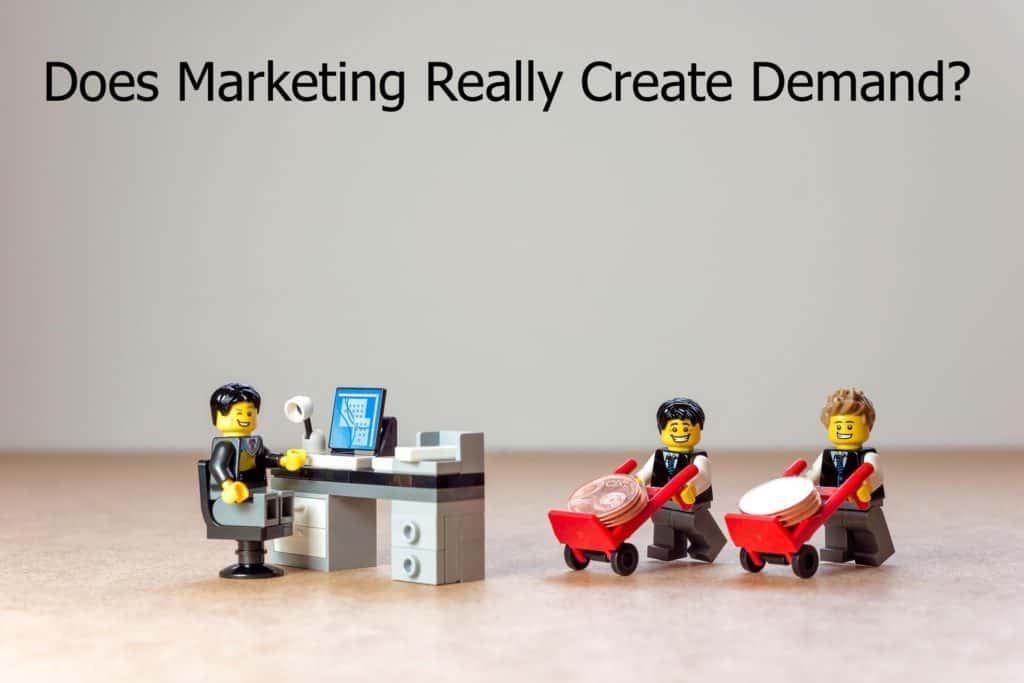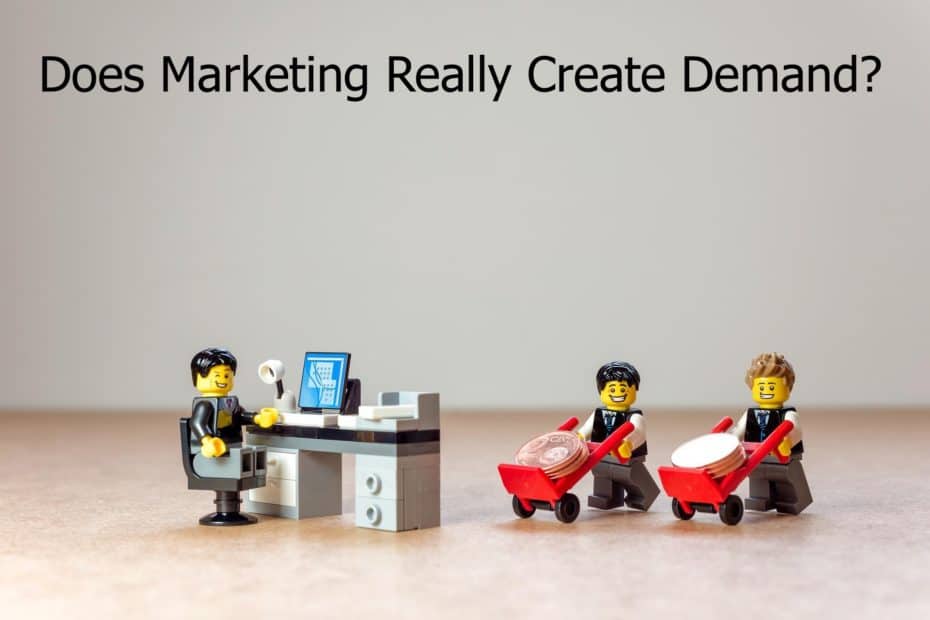
There is an idea that I’ve seen over and over again. It’s that marketing creates demand.
You might agree because you have seen that when you’re actively marketing sales are doing well. You’re creating demand.
That’s not always the case though. There are plenty of companies that have heavily marketed a product and then watched it flop.
You might simply say, “Of course, the product flopped because the marketing wasn’t very good. Bad marketing won’t create demand. Only good marketing can do this.”
While poor marketing can impact the best of products it’s not entirely accurate to blame the lack of demand on the marketing just like it may not be accurate to give marketing the credit for creating demand.
Can good marketing create demand? That’s the topic I’ll discuss today.
What is Demand?
To put it in economic terms, demand is the desire to purchase a product or service.
Pretty simple, right?
Let’s examine this through an example.
You currently live in small two bedroom house with your spouse, a two-year-old child, and your miniature dachshund. You have another child on the way and both you and your spouse know you need a bigger place.
You already feel like you live in a tiny space where you run into everything and trip over toys. And while you technically have a backyard, even your dog finds it insulting that you think it’s a big enough space for her and demands a walk every day.
Your desire to purchase a new home is being fueled by the fact your simply not going to have room if you stay put. While adding another child in this cramped space might work in the short term, it simply isn’t feasible in the long term.
Your need is also a desire.
You want a home where both you and your spouse can be in the kitchen at the same time without running into each other. Where the closets aren’t bulging and threatening to explode. Where your kids and your dog can have a place to hang out that’s bigger than a postage stamp. A place where you can have your friends over and not have it feel like a cramped elevator.
Demand isn’t just fueled by your needs. It’s also fueled by wants.
Going to a concert, on a vacation, buying a new outfit or getting a new 70″ smart TV.
Marketing can play a part in you finding out about these things, where you buy, and what you get.
So, does marketing create demand? That is, does it create the desire for you to buy a product or service?
To answer this question let’s talk briefly about how marketing works.
What Does Marketing Do?
Marketing isn’t sales. It is a way to connect to people.
You may scoff at this idea but good marketing connects you to people who may be interested in your product.
If you want to get technical about it, marketing is a form of communication that is trying to create awareness, interest, and consideration in something.
This could be anything. From purchasing a product or service to making a donation to a charity. It could also be to get you to take a certain action such as recycling or joining a cause.
Many marketers like to describe the process from awareness to a sale in something like a sales funnel or buyer’s journey.
The sales funnel looks at the journey from a company’s point of view while the buyer’s journey looks at the same process from the view of the customer.
They both are concerned with awareness, interest, and consideration.
It all starts with awareness. I like to equate awareness to fame.
If somebody isn’t aware of your company or the products and/or services you sell they won’t ever entertain doing business with you. In other words, they need to know who you are. This is an important step but it doesn’t stop here.
There needs to be interest. If there is no interest, again, there’s no chance of a sale or donation.
Keep in mind, that you can be aware of something and not be interested. Think of all the things you know about but would never spend your money on.
Good marketing can also help people decide to consider taking action. Depending on the cost of the item, this can be a quick decision or it can lead to a period of research where you’re reviewing and comparing.
Something like a candy bar isn’t likely to require much consideration where buying a new car will require more.
Without going through these three steps, nobody is doing anything.
Good marketing needs to properly communicate with people in these stages and good marketers will have done the research to help them do this.
This leads us back to the original question.
Does Marketing Create Demand?
Nope.
Marketing does not create demand.
Not convinced?
Ok.
Let’s look at this in a different way.
You come home after a long day at work and the kids are complaining about having nothing to eat.
They say this a lot but after looking through the pantry and in the refrigerator you notice that you are out of some items and it might be time to go to the grocery store.
You take inventory and create a list. You ask the kids and your spouse and they offer some suggestions as well.
You jump in the car and head to the grocery store and an hour later you return with your groceries.
Did marketing have any impact on your need to go to the grocery store?
No.
Essentially, you had to purchase food because you need to keep everybody fed. Marketing had nothing to do with this.
However, marketing may have had an impact on something that you bought at the grocery store. Especially if you purchased an item that you wouldn’t normally purchase.
You may have seen a beer commercial and thought it sounded good because you haven’t had a beer in a while.
Did the commercial create demand? No, It reminded you that it was something you could buy. Your feelings about beer did the rest.
Let’s look at a different example.
Kids are highly influenced by marketing.
The commercials I remember most from when I was a kid are the cereal commercials.
I am a chocoholic so I really enjoyed eating Cocoa Pebbles when I was young.
One day I saw a commercial for Count Chocula. It was basically the same as Cocoa Pebbles but it had mini chocolate marshmallows as well.
I. Was. Sold.
I talked my mom into getting them for me and they were delicious.
Did the commercial I saw create demand? No.
Did it create awareness, interest, and consideration?
Yes. All in the span of 30 seconds.
The Count was especially persuasive.
My only obstacle was my mom. I had to convince her to buy them for me and luckily she agreed.
Let’s break this down.
If I didn’t like chocolate, the commercial would have done nothing. I would have ignored it.
The commercial didn’t create demand. It spoke to what I wanted.
The idea of adding chocolate marshmallows into the mix. Brilliant. Cocoa Pebbles never had a chance after that.
This is what great marketing does. It speaks to you. It’s like it knows your wants and needs.
This is when the magic happens. When you feel like the marketing is speaking directly to you, going from awareness to the sale can happen really fast.
Marketing doesn’t create desire but it does speak to it.
If you don’t like wine, a million pieces of marketing won’t convince you to buy it.
If a streaming service doesn’t have the programming you want, you won’t subscribe. Marketing won’t change it.
If the trailer for that new movie doesn’t look good, you won’t go to the theater. Will marketing change this? No.
Marketing doesn’t create demand.
When it’s done well and speaks to the right audience it opens up people to act on their desire. It doesn’t create it.
They always had it, the marketing just spoke to it in a way in which people gave themselves permission to act.
Stop thinking about marketing as creating and demand and instead look at it as a way to unleash it.
*Image by www_slon_pics from Pixabay
- The Importance of Creating a Connection With Your Marketing - June 6, 2024
- Reach vs Visibility: Which is Right for Your Marketing? - February 13, 2024
- Focus Your Marketing Efforts By Saying “No” - December 13, 2023

